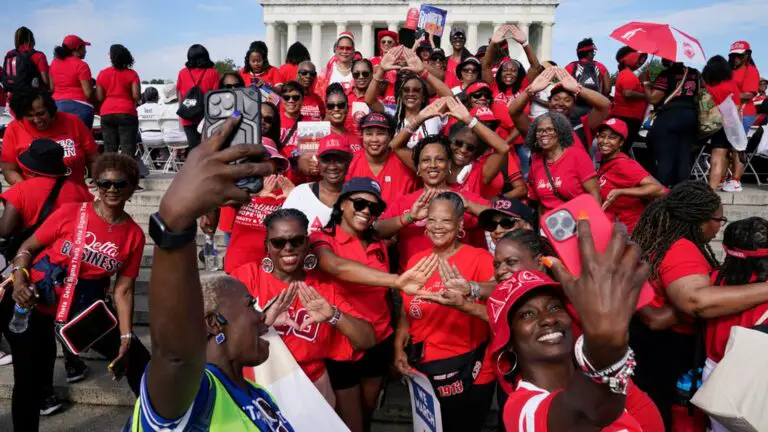A Gathering of Dreams and Disparities: 60 Years After the March on Washington
A rumble swept through the National Mall as thousands convened to mark the 60th anniversary of Martin Luther King Jr’s historic March on Washington. The memories of that day may have faded, but the truth remains stark: racial inequality still thrives in the heart of the US, and King’s visionary dream is far from a reality.
Alphonso David, at the helm of the Global Black Economic Forum, stood amidst the march’s rhythm, reflecting on progress over six decades since Dr. King’s momentous march. “We’ve advanced,” he declared, “but don’t mistake it for reaching the mountaintop. Not yet.”
Hosted by the Kings’ Drum Major Institute and the Rev Al Sharpton’s National Action Network, this event brought together a tapestry of leaders fighting for Black civil rights and a diverse spectrum of allies. The same grounds where a quarter-million souls congregated in 1963, forging one of America’s defining chapters for fairness and equal rights, played host again.
It was there that King’s voice soared with his “I have a dream” speech, a phrase that remains etched in history’s core as one of its most celebrated orations.
Divergence marked the path of this Saturday’s gathering from its 1963 precursor. Echoing through the air were discussions about the rights of LGBTQ individuals and Asian Americans. Notably, more women graced the podium, in stark contrast to a time when a lone woman’s voice broke the silence.
Pamela Mays McDonald, who stood amidst the throng in her childhood, recalled, “I was eight when the original march unfurled. Just one woman was heard back then—she hailed from my Arkansas home. Look at today: women populate the stage.”
Bittersweet flavors tinged the differences for some. Marsha Dean Phelts, hailing from Florida, mused, “I glance backward and envision the reflection pool and the Washington Monument. Six decades back, a quarter-million fervent souls, now just a trickle. The fervor has waned, but our needs endure.”
In a backdrop where planes ascended from Ronald Reagan National Airport, and people indulged in rugby and jogging, messages surged forth from the podium. The speeches intertwined with the sounds of takeoffs and exertions, capturing a slice of America’s vibrant tapestry.
In a reverent visit on the prior Friday, Martin Luther King III and his sister, Bernice King, graced their father’s monument. Bernice’s words resonated, “He stands as an emblem of authority, demanding, ‘We’ve got to set this right.'”
Amidst the constellation of voices, actor Sacha Baron Cohen and Ambassador Andrew Young, who once stood as King’s counselor and orchestrator of the first march, took to the stage. The mosaic included leaders from NAACP and the National Urban League, voices unified in their purpose.
Leaders from the organizing fronts joined forces with attorney general Merrick Garland and assistant attorney general Kristen Clarke. The discourse delved into issues spanning voting rights, policing, and redlining, encapsulating the trials that still beset a nation.
This assembly, culminating on the verge of the 28th August anniversary, a date etched in history, paved the way for President Joe Biden and Vice President Kamala Harris to commemorate the occasion. A rendezvous with the architects of the 1963 march awaited them, extending an invite to all heirs of Martin Luther King Jr.
For Rev Al Sharpton, architect of the National Action Network, this pilgrimage bears witness to a promise made to Coretta Scott King, the matron of the King family. An encounter 23 years past set in motion a legacy’s sustenance, propelling Rev Sharpton, Martin, and Arndrea on an unforeseen path.
As the National Mall echoed with resonant voices and distant engines, a collective pulse surged, keeping alive the dreams and disparities, the echoes of that fateful march reverberating through the ages.

